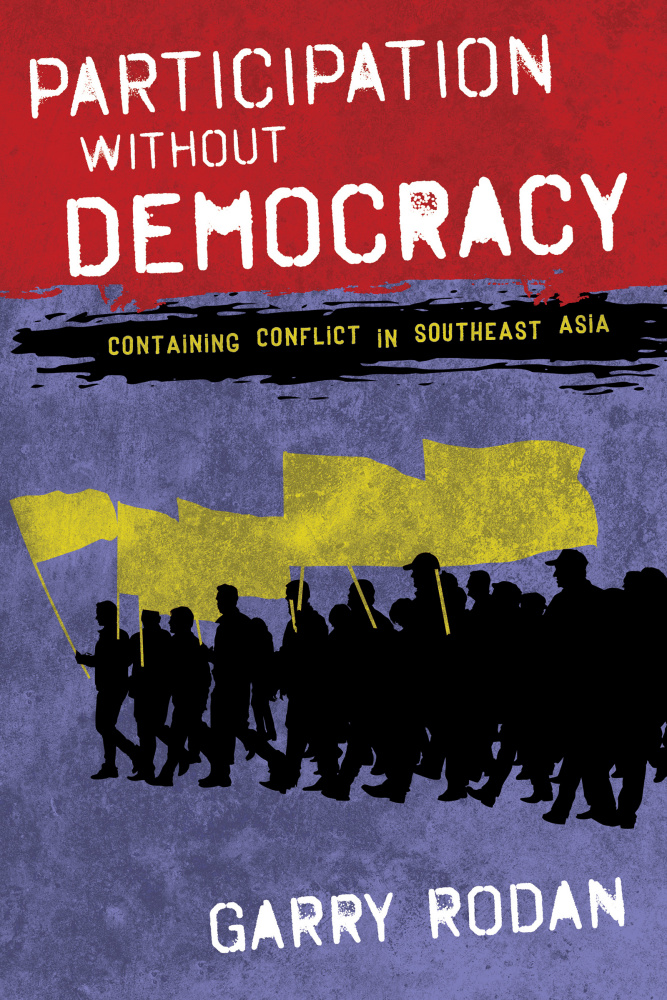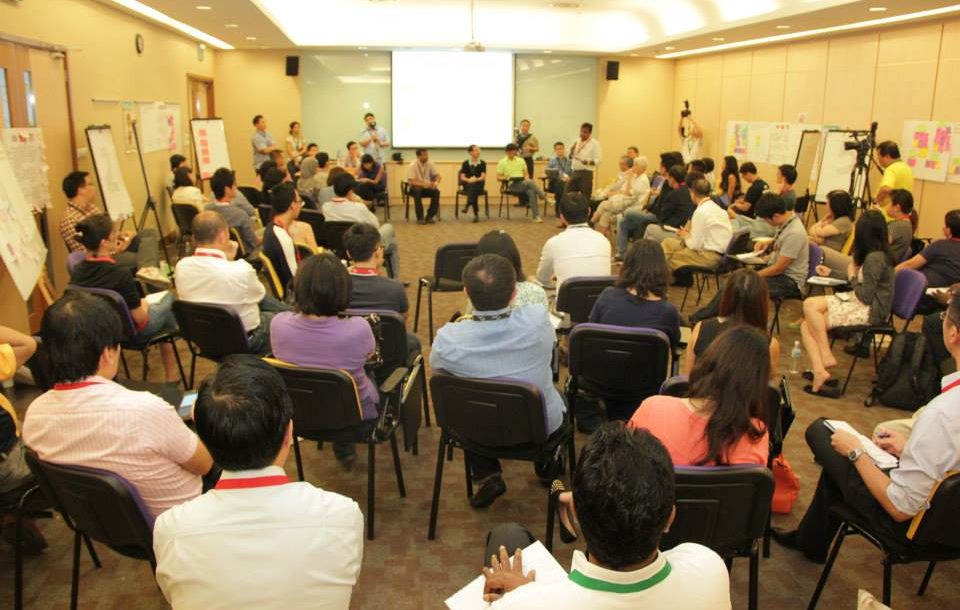Those of us who study politics differ on whether our discipline is rightly termed a “science”. People who weigh in on the “scientific” side tend to emphasise, alongside the permeation of numbers and deductive hypothesis-testing, the stock of knowledge we have accumulated: core concepts and theories, tested and refined over time. With his provocative latest book, Participation without Democracy: Containing Conflict in Southeast Asia, Murdoch University’s Garry Rodan puts years of field research and insight honed over decades to work to prove that such pretensions are more aspirational than well-founded. His argument, taken to its logical conclusion, impugns much of what political scientists study when we study “democracy”. It suggests we have missed the crux both of what distinguishes regime types, and of what sorts of political dynamics spur, constitute, and emerge from transitions. And his argument is convincing.
Southeast Asia—home to a bewildering array of institutional innovations—offers Rodan a trove of variation to mine, as he probes how these states really function. Those readers familiar with Rodan’s extensive oeuvre will note points of continuity with his earlier work: the inseparability of politics from economic forces, the salience of civil society, the crafty ways in which regimes and their leaders sustain dominance. With its rich detail and critical perspective, this book seems something of a capstone as Rodan approaches formal retirement, bringing his rich, career-spanning material on Singapore as well as Malaysia into conversation with a similarly nuanced discussion of the Philippines, and weaving together theoretical threads.
 Participation without Democracy places modes of participation (MOPs) front and centre, characterising regimes in terms of both the extent and the type of participation and contestation possible. The book is explicitly oriented toward theory; hopefully the words “Southeast Asia” in the title will not deter readers focussed on other regions. But Rodan builds his analysis with fine-grained evidence, astutely assessed, from his three cases.
Participation without Democracy places modes of participation (MOPs) front and centre, characterising regimes in terms of both the extent and the type of participation and contestation possible. The book is explicitly oriented toward theory; hopefully the words “Southeast Asia” in the title will not deter readers focussed on other regions. But Rodan builds his analysis with fine-grained evidence, astutely assessed, from his three cases.
He proposes that elites meet the challenges that contradictions of capitalism pose—rising inequality, social disruption and others—by introducing new modes of popular participation. Elites use these MOPs to contain and channel dissent, while deepening concentrations of power and wealth; opponents sometimes hope these same modes offer tools to dismantle elite power. The “central paradox” Rodan traces is the extent to which “expanded political representation—in both its democratic and nondemocratic forms—is serving more to constrain political contestation than to enhance it”. Regimes and the elites at their helm find ways of serving their own interests by strategies that may look participatory on paper but, in practice, narrow the space for contestation and fragment or co-opt challengers.
Political scientists have long placed participation and contestation at the fore of definitions of democracy, but usually with a primarily electoral focus and more as indicators to be measured than as patterns requiring qualitative evaluation. Rodan demonstrates that we need to delve deeper: to ask not just whether participation happens, but who can participate and via what modes, which questions are open to debate and what happens to input gathered. He brings ideology squarely into the frame, not just vis-à-vis neoliberalism—he presumes elites are devout capitalists and popular opponents, less so—but also as shaping how citizens and states engage and pursue their respective interests.
Rodan argues that consultative and particularist ideologies predominate in the Southeast Asian cases he studies. The former favours technocratic, seemingly apolitical problem-solving without political competition while the latter favours discrete communities’ or identities’ rights to specific representation. He also finds germane, though, democratic ideologies (those that facilitate challenges to inequalities inherent to a hierarchical order) and institutionally unbounded (and infirming) populist ideologies. By embedding their preferred ideological frame in institutions—MOPs—elites may fragment or delegitimate challengers and corral the scope of debate. While these ideologies of representation are not mutually exclusive, the “struggle over the permissible boundaries of political conflict” is central to what constitutes politics.
MOPs emerge from relationships within capitalism, developed over time. History matters—especially legacies of Cold War-era suppression of the left and its institutions. Also, the sites of participation under different modes shape the sort of inclusion they allow. On the menu are autonomous individualised political expression, extra-state civil societal expression, collective societal incorporation, and state-sponsored, individual administrative incorporation. This framework shifts our gaze from democratic elections or authoritarian coercion to, for instance, the extent to which civil society is organised and articulated with or independent of political parties, and the breadth of elite-challenging issues and alliances.
Rodan uses two broad initiatives or patterns from each of his three countries to illuminate distinct MOPs and tease apart how each regime functions. Singapore exemplifies societal and administration incorporation, driven by a largely consultative and particularist ideology of representation. Rodan homes in first on the explicitly nondemocratic Nominated Member of Parliament scheme, designed to pre-empt partisan parliamentary opposition by incorporating unaccountable and appointed representatives of sectors and under-represented social segments (who might otherwise find common purpose and/or drift toward opposition parties) for their apolitical expertise. He parses, too, a series of institutions and initiatives for soliciting individuals’ policy feedback, from elaborate ongoing mechanisms to periodic mass “conversations”—albeit with largely pre-set agendas and without necessary influence. This vision of incorporating feedback demonstrates, Rodan explains, a technocratic ideology of politics as the “noncompetitive technical exercise of solving problems”.
In the Philippines, state institutions and capacities serve the interests of oligarchs, who are challenged by opponents ranging from moderate social democrats to anti-capitalist revolutionaries, all with differing visions of democratic representation. Rodan’s first case, the party-list system for electing a share of members of Congress, encourages fragmentation of challengers (as by a three-seat-per-contender cap). The system has been co-opted by forces of traditional politics; it does more to contain than amplify threats to elite privilege.
Meanwhile, proponents of bottom-up budgeting, introduced in 2012, pressed hard-to-reconcile the goals of first, reforming undemocratic institutions via fortified civil societal organisations and second, problem-solving efficiency. That divide served to diminish its role even before Duterte nixed it altogether, and was exacerbated by the program’s ideologically consultative approach of incorporating stakeholders and expertise into cooperative deliberation on elite-defined policy problems.
Lastly, in Malaysia, we find the challenges of a deep-set and structurally reinforced particularist ideology, rendering any sustainable, shared alternative vision elusive. Rodan details how the deep permeation of that ideology has effectively scuttled periodic, carefully delimited initiatives for high-level economic policy consultation and transformation. Any real challenge to extant privilege, as well as critique of the integrity of state institutions, have been put beyond the pale. Last May’s electoral upset may have loosened strictures on the latter front, but to question racial privilege remains, for now, verboten. Over time, these initiatives have disabused many reformers otherwise willing to accept administrative incorporation of hopes of genuine influence. Overall, there are fewer consolidated state-sponsored, extra-parliamentary MOPs in Malaysia than in Singapore or the Philippines, even despite the launch, post-publication, of new consultative initiatives.
The more independent modes that have emerged in Malaysia also face hurdles. Efforts to coordinate within civil society, Rodan argues, as for restoration of local-government elections or broader electoral reform, had made headway even before the 2018 elections. This could be seen most notably in the at least minimal inclusion of nonpartisan local counsellors in opposition-controlled Penang and Selangor after 2008 and the wide-ranging, if more catch-all than coherent, Bersih coalition. But the vagaries of Malaysia’s political economy, as well as NGOs’ preference for prioritising liberal ideological notions of good governance and individual liberties rather than economic issues, intercede. Bersih, for instance, lacks “a socially redistributive reform agenda to address structural inequalities”, without which “UMNO’s particularist ideologies of race and ethnicity would remain seductive for many disadvantaged Malays”. The new government’s embrace of ethnic particularism as a core plank of its campaign strategy in 2018, he suggests, was an unsurprising result.
As Rodan illustrates, these three countries manifest different patterns of capitalist development, including the role of the state and parties, such that they may even adopt similar MOPs with different motives. In all, though, we see starkly the gap between participation and even discursive, or issue-based, representation. In all, we see the balance among and implications of different MOPs as encoding and reinforcing ideas about how power is organised and what it means to be represented—from being permitted to help hone pre-defined policies to being able to change policy agendas, and from participating qua individuals or officially sanctioned categories to seeing promise in and space for novel collective mobilisation. This all presses us to assess regimes less in terms of their institutional structures than per a deeper evaluation of whether those institutions serve more to consolidate elite control or empower outsiders—an issue less of whether the institutions “work” than of how they are designed, and in whose interests.
Rodan’s analysis throws down the gauntlet to scholars of regimes. He offers a trenchant, if polite, rejoinder to more superficial assessments, and ups the ante by concluding with sketches of how an MOP framework helps us to understand contemporary populist challenges or transitions to other institutional forms. He considers how an MOP framework may also assist in making sense of the permeation of depoliticising consultative and particularist ideologies in established democracies such as the UK. The agenda Rodan presents recommends a fundamentally different approach to understanding and classifying regimes—one which will surely call into question the status of most purported democracies by scrutinising how the policy/political process actually works.
Wielding the purse strings of Southeast Asian civil society
Illiberalism at home, and pro-market ideologies abroad, are putting pressure on Southeast Asian civil society organisations' financial health.
But it is not just scholarly observers, but domestic reformers, who may find Rodan’s analysis challenging. Rodan stops short of describing what MOPs would enable effective challenges to elites and their privileges—real democracy—or from what quarters we might expect such a push. Which interests understand themselves sufficiently as silenced that they seek another path, and how might institutions be remade (or opposition parties be induced) to engage with those perspectives and preferences more directly? There is an underlying assumption here of a politically neglected non- or anti-neoliberal core in all three states, not just the Philippines, ready to be mobilised.
One might ask, though—particularly given the now-protracted enervation of organised labour, plus mass investment in capitalism (for example, cross-class participation in stock markets), however manifestly inegalitarian—whether alternative ideologies are now more decrepit or discarded than actively suppressed. And are there positive examples operating alongside, and perhaps at cross-purposes to, these institutions: have these patterns of social conflict yielded also more progressive, perhaps even scalable, MOPs? Put differently, where do we go from here, beyond trudging resignedly toward an elitist, contention-stifling future? Uplifting this book is not —but Rodan’s provocative exegesis is not just a good read, but a call to rethink how we study as well as pursue participation, representation and elite-challenging reform.
. . . . . . . . . . . . . . . . . . . . . . . . . . . . . .

 Facebook
Facebook  Twitter
Twitter  Soundcloud
Soundcloud  Youtube
Youtube  Rss
Rss 
